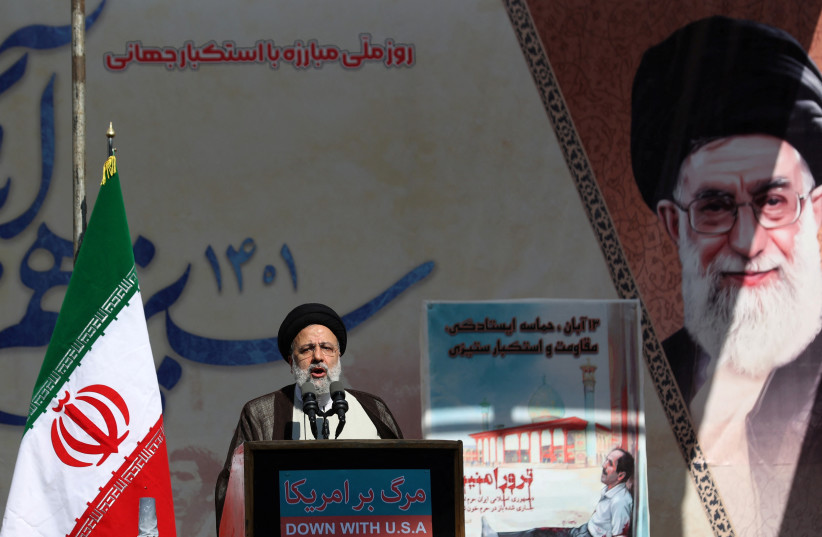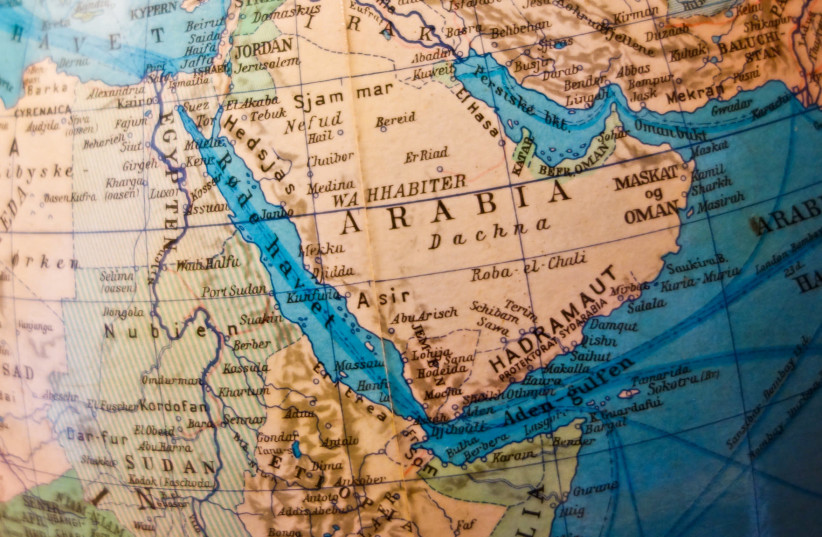by Seth J. Frantzman
After the UAE and Saudi Arabia reconciled with Tehran, it would make sense for Iran to reach out to Bahrain.
 |
Iran's President Ebrahim Raisi speaks during the
43rd anniversary of the U.S. expulsion from Iran, in Tehran, Iran
November 4, 2022
(photo credit: MAJID ASGARIPOUR/WANA (WEST ASIA NEWS AGENCY) VIA REUTERS)
|
Iran appears to be looking to normalize ties with Bahrain in the wake of the reconciliation with Saudi Arabia in a deal hosted by China.
It follows a wider attempt by Iran to renew relations and improve ties across the Gulf.
Bahrain would be the next logical choice as it is close to Saudi Arabia in foreign policy terms. When the Abraham Accords were signed, Riyadh backed both Bahrain and the UAE in their normalization with Israel. Additionally, during the Arab Spring when there were threats to Bahrain, Riyadh backed intervention to support the monarchy.
Iran seeks connection with other gulf countries
According to several reports, including at IRNA and Radio Farda, as well as Russian-backed Sputnik and Middle East Monitor, the talks are in motion. One report noted that Iran’s Foreign Ministry discussed an attempt to seek “connection with other regional countries as well, including Bahrain,” adding that “the resumption of political relations between Iran and Saudi Arabia shows the effectiveness and success of diplomacy as a solution to settle differences.”
What is important here is the context. The Gulf is an important region and its countries each have slightly different foreign policy histories. Qatar has been closer to Iran and never joined Saudi Arabia or the UAE and Bahrain during the years of Iran tensions. It also never normalized ties with Israel.

Kuwait is also reluctant to antagonize Iran, having been traumatized by Iraq’s invasion and brief occupation in 1990. It also remembers the tanker war of the 1980s, leading to its preference to be less central in disputes. Kuwait’s seeming neutrality in issues in the Gulf enables it also to serve as a talking spot and dialogue point. Although, it has been historically hostile to Israel.
Oman, in contrast, has actively sought to play a neutral role and conducted outreach to Israel prior to the Abraham Accords. It also hosted Iranian delegations frequently and worked with the US, India and other Gulf states. It also hosted Syrian President Bashar Assad as part of a wider Gulf reconciliation with the Syrian regime.
The UAE and Saudi Arabia have been the foreign policy powerhouses in the Gulf in recent years. Both countries severed ties with Qatar in 2017. Reconciliation took place in 2021. The UAE and Saudi Arabia also intervened in Yemen in 2015. Both countries were targeted by the Iranian-backed Houthis, and Iran targeted Saudi Arabia’s Abqaiq in 2019.
Bahrain has a small population, is close to the UAE and Saudi Arabia and relies on Riyadh and Abu Dhabi for support. It also hosts an important US naval base, as do Qatar and the UAE.
Therefore, Bahrain is careful in its relations. It has been supportive of outreach to Israel and coexistence, but it knows that historically Iran has tried to undermine its monarchy and to highlight human rights and sectarian issues in Bahrain because of the Shi’ite population there.
This is also a sensitive issue in Saudi Arabia’s Qatif area and the Eastern Province. So, reconciliation with Iran would ostensibly need to come with guarantees that it will stop creating tensions among Shi’ite minorities in the Gulf.
Iran has used its media over the years to try to undermine support for any Gulf state tied to Israel, a glaring sensitive issue as well. So, after the UAE and Saudi Arabia reconciled, it would make sense for Iran to reach out to Bahrain.
The reports that Bahrain is open to Iranian normalization would please Iran, exhibiting as yet another example of diplomatic success. It has portrayed in its media the rapprochement with Riyadh as a loss for the US and Israel.
This may not be accurate but it is how Iran perceives these discussions. This is why Iranian media are pushing the story about talks with Bahrain.
It remains to be seen if the talks bear fruit. However, it would not be surprising, in the wake of the Saudi deal, that Iran and Bahrain could rekindle ties.
Seth J. Frantzman
Source: https://www.jpost.com/international/article-734347
No comments:
Post a Comment